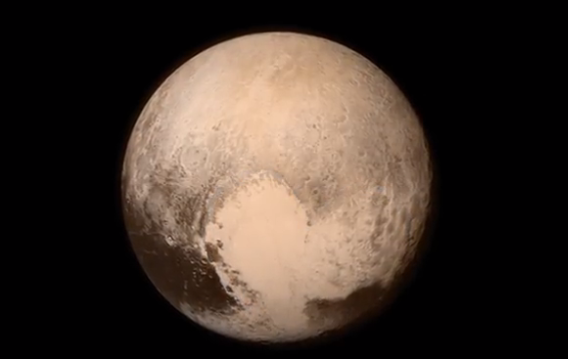When New Horizons set off toward Pluto in 2006, we had almost no idea what we would find there.
2006年,当“新视野”号向冥王星进发时,我们几乎不知道会在那里发现什么。
We knew a little about its size and composition, but that was mostly it.
我们只了解它的大小和构成,但仅此而已。
We didn't even really know what it looked like.
我们甚至不知道它的样子。
Then, on July 14, 2015, New Horizons showed up at Pluto, and totally blew our minds.
接着在2015年7月14日,“新视野”号出现在了冥王星附近,给我们带来巨大的思想冲击。
We found out the Pluto system is one of the coolest places we've ever explored.
我们发现冥王星系统是我们探索过的最酷的地方之一。
So to celebrate the fly-by's two-year anniversary, here are some of the most exciting things that we've learned.
所以,为了庆祝这个两周年飞行纪念日,我们分享一些了解到的最令人兴奋的事情。
First, there's that giant, super cute heart, which scientists informally called Sputnik Planum.
首先,冥王星有一个超级可爱的心脏,科学家戏称它为“史泼尼克平原”。
That area is made up mostly of slowly flowing, frozen nitrogen.
该地区主要是缓慢流动的冷冻氮。
The mass of moving ice is one of the largest glaciers in the solar system!
氮冰块是太阳系中最大的冰川之一。
But what's especially neat is that the nitrogen ice is undergoing convection, the circular current that forms as material heats up and cools down.
更让人惊奇的是氮冰在流动,受热冷却后形成环流。
Pluto is pretty cold, at around -230 degrees Celsius on average.
冥王星很冷,平均温度在零下230摄氏度。
But the elements slowly decaying in Pluto's core create just enough heat to make underground nitrogen ice all soft and mushy.
但是,在冥王星核心慢慢衰减的元素产生了足够的热量,使地下的氮冰总是柔软黏稠。
Then, that soft ice rises to the surface, cools down, and sinks underground again, kinda like a gigantic, groovy lava lamp.
然后,软冰上升到表面,冷却后再次沉入地下,就像一个巨大而绝妙的熔岩灯。
A lot of scientists didn't expect to see active geology on Pluto, which made this discovery an awesome surprise.
许多科学家没想到能在冥王星上看到活跃的地质活动,因此,这个发现令人惊喜。
New Horizons found that Pluto has plenty of mountains, too, including some covered in methane ice.
“新视野”号发现,冥王星也有很多山脉,有一些被甲烷冰覆盖着。
And some of those mountains, like one called Wright Mons, even look like they could be cryovolcanoes, or ice volcanoes.
其中一些山脉如“莱特山”,甚至看起来像是冰火山。
We didn't see anything actively erupting when New Horizons flew by,
当“新视野”号飞过冥王星时,我们没有看到任何活跃的火山喷发。
so we don't know for sure, but these volcanoes might erupt with a mixture of water ice, ammonia, methane, or frozen nitrogen.
所以我们也不确定,但这些火山可能会喷发出水冰、氨、甲烷或冷冻氮的混合物。
Which is pretty neat for a little world so far away.
到目前为止,这个小世界是多么精彩啊!

And the discoveries about Pluto weren't limited to the ground, or what could potentially erupt out of it.
我们对冥王星的发现并不局限于地面,或者是它会爆发出来什么东西。
New Horizons also found out that Pluto's sky is blue. It's just like home!
“新视野”号也发现冥王星的天空是蓝色的,就像地球一样。
That is, besides the freezing temperatures, lack of sunlight, and toxic air.
也就是说,除了气温冰冷、阳光缺乏和空气有毒之外,它和地球一样。
Here on Earth, the sky is blue because molecules like nitrogen in the atmosphere scatter sunlight,
地球上,天空的蓝色是由大气层中的氮分子散射阳光导致的,
but on Pluto, molecules called tholins do the scattering.
但在冥王星上,一种叫做托林的分子散射阳光。
Tholins are complex, organic molecules that form when UV light from the sun reacts with the nitrogen and methane in Pluto's atmosphere.
托林是太阳的紫外线与冥王星大气中的氮和甲烷发生反应所形成的复杂有机分子。
The tholins themselves are probably grey or red, and they help give Pluto's surface some of its color.
托林自身可能是灰色或红色,使得冥王星表面都有些灰红色。
But their small size makes them perfect for scattering blue light.
但它们尺寸小,适合散射蓝光。
Aww! There's nothing like finding little reminders of home billions of kilometers away.
哇哦!没有什么比在数十亿公里之外的地方找到有乡味儿的东西更好的了!
While it was flying past Pluto, New Horizons also got our closest look at Pluto's moons: Charon, Hydra, Nix, Styx, and Kerberos.
“新视野”号经过冥王星时,使我们近距离看到它的卫星:冥卫一、 冥卫三、冥卫二、冥卫五和冥卫四。
And the largest moon, Charon, had some fun surprises.
而它最大的卫星冥卫一,有些惊喜之处。
For one thing, its north pole, which the New Horizons team dubbed Mordor, is dark red, and Pluto might have had something to do with that.
一方面,它的北极,被“新视野”团队称为莫多的地方是暗红色的,这可能与冥王星有关。
In a paper published in the journal Nature last year,
在去年发表于《自然》杂志上的一篇论文中,
scientists suggested Charon's pole is red because Pluto's atmosphere is staining it.
科学家们认为,莫多北极的红色是由冥王星的大气层沾染的。
After methane escapes from Pluto's atmosphere, it's caught by Charon's gravity and then collects and freezes on the moon's north pole,
甲烷从冥王星的大气层中逃逸出来之后,被冥卫一吸引,在它的北极聚集冻结。
one of the only places on Charon cold enough to have frozen methane all year.
这是它唯一一处冰冷、能够全年冰冻甲烷的地方。
Then, ultraviolet rays from the sun cause a chemical reaction in the methane,
然后,来自太阳的紫外线引起甲烷的化学反应,
which turns it into tholins, those same reddish, organic molecules that make Pluto's sky blue.
使它变成托林,这些泛红的有机分子导致冥王星的天空呈现蓝色。
We've never seen coloring like Charon's before, and it looks like we can thank Pluto for that, too.
我们从未见过冥卫一这样的颜色,看起来我们应该感谢冥王星。
But Charon can also take credit for some of its awesome features.
但冥卫一也因其极好的特征赢得好评。
Like its gigantic canyon system that's 1800 kilometers long and up to 7.5 kilometers deep.
如它的巨大峡谷有1800公里长,7.5公里深。
That's four times as long and four times as deep as the Grand Canyon, even though Charon's diameter is less than 10% of Earth's.
它的长度和深度都是科罗拉多大峡谷的四倍,即使冥卫一的直径还不到地球的10%。
The canyon probably stretches around most of Charon's surface,
这个峡谷可能延伸到冥卫一的大部分表面,
and there are also plenty of mountains on what we thought was going to be a boring, little moon.
我们一度认为它将是一个无聊的小卫星,但它有很多山脉。
Charon might have ended up with that weirdly uneven geology because of a subsurface ocean that froze a few hundred million years after the moon formed.
冥卫一可能最终会因其奇怪的不平衡地质而终结,因为它形成后有一个被冻结了几百万年的地下海洋。
Most of Charon's surface is made up of water ice, but astronomers think that right after Charon formed, it might have been hot enough to melt some of the ice underground.
冥卫一的大部分表面是由水冰构成的,但天文学家认为这很正常,因为它形成之后,其热度可能足以融化一些地下冰了。
Then, over time, the underground ocean could have frozen, expanded, and created that huge fracture in Charon's surface.
随着时间的推移,地下海洋可能冻结、膨胀,并在冥卫一的表面形成了巨大的裂缝。
We're not positive that's exactly what happened, but the possibility of another ocean in the solar system is just plain awesome.
我们不知道具体发生了什么,但太阳系中可能有另一个海洋实在是太棒了。
So from the tip top of ice volcanoes to the bottom of super canyons,
所以从冰火山顶端到超级峡谷底部,
New Horizons has shown us that the Kuiper Belt is way more fascinating than we thought.
“新视野”号向我们展示了凯伯带比我们想象的更吸引人。
And two years later, scientists still have plenty of data to analyze,
两年后,科学家们仍然有大量的数据要分析,
so we'll be learning a lot more about Pluto and its moons in the future.
所以我们将在未来学习更多关于冥王星及其卫星的知识。
Meanwhile, New Horizons is on track to visit another object in the Kuiper Belt, called 2014 MU69, on New Year's Day, 2019.
与此同时,“新视野”号将于2019年元旦参观凯伯带的另一颗叫做2014 MU69的天体。
So this little spacecraft isn't done teaching us about the solar system yet. And neither are we!
所以这个小宇宙飞船还没有告诉我们整个太阳系的情况,我们也没学完!
SciShow Space exists because of support from our Patreon patrons like SR Foxley, our president of space!
感谢我们空间站的会长“SR Foxley”等的大力赞助支持。
If want to be president of space, or do fun stuff like join our monthly hangout,
如果你想成为空间站的会长或做一些有趣的事情,如加入我们每月的聚会,
while helping to support SciShow, go to patreon.com/scishow.
在帮助支持太空科学秀的同时,不要忘了去关注patreon.com/scishow哦。
Thanks! You guys are awesome!
感谢您的收看,你们很棒!











